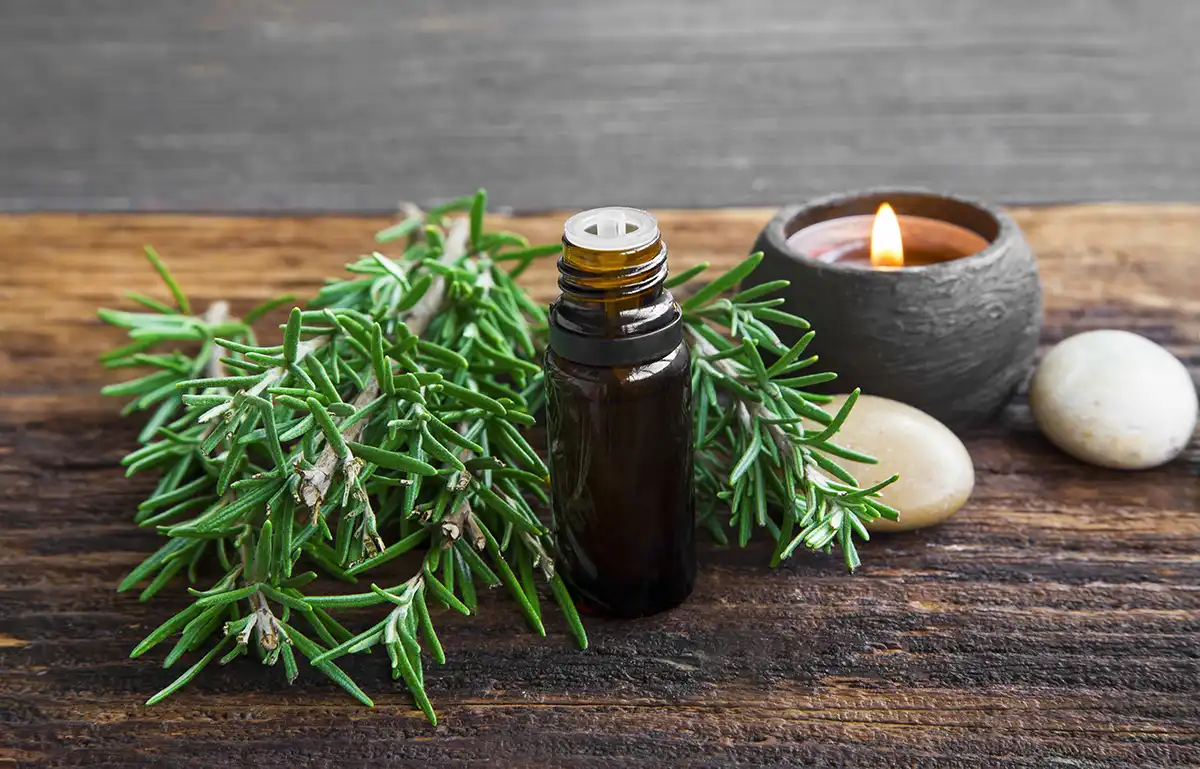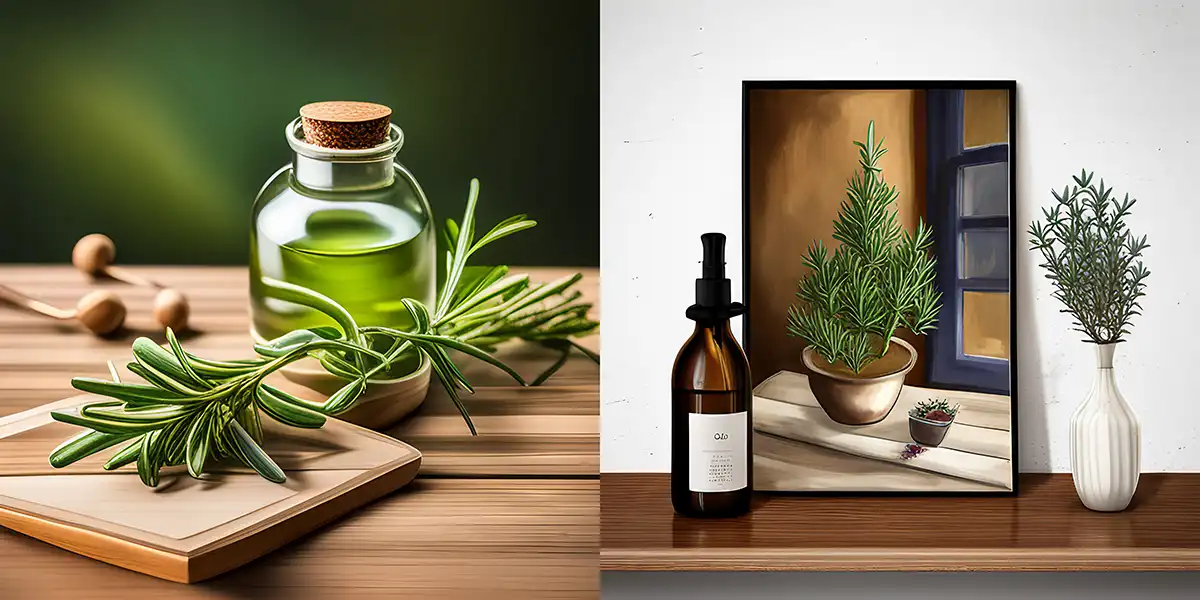Rosemary essential oil is a popular and versatile oil derived from the Rosemary plant, an evergreen bushy shrub. Rosemary is a common herb in the mint family and is a popular kitchen herb to grow as it helps to promote healthy digestion. It also has good drought-resistant properties – useful if you forget to water plants! In addition, their refreshing, herbaceous aroma has been used for centuries in folk medicine for its incredible health benefits.
There are over 150 varieties of Rosemary shrubs, and the chemical makeup of Rosemary essential oil depends on where the plant is grown. Aromatherapists tend to use essential oils from 3 varieties: Rosemary verbenone is safe with children and can be used at night as it is not too stimulating; the camphor-rich varieties typically come from France and Spain and are very good muscle relaxants, and the cineole-rich varieties are very good for helping with respiratory conditions. Steam distillation ensures the potent properties of the plant are preserved.
New research confirms that Rosemary oil has potential benefits, including cognitive enhancement, anti-inflammatory and antioxidant effects, and improved skin and hair health. Let’s explore this wonderful herb’s history, therapeutic benefits, and safe and effective usage tips.
Introduction to Rosemary Essential Oil and Its History
Rosemary oil is extracted from the leaves of Rosmarinus officinalis, a woody, perennial herb native to the Mediterranean region. It has been known as a healing herb for centuries and used in cooking for its delicious, herbaceous aroma and digestive benefits. The name “Rosemary” comes from the Latin word Rosmarinus, which means “dew of the sea,” likely referring to the plant’s native habitat and its ability to thrive in coastal climates.
Traditional Uses of Rosemary Essential Oil in Folk Medicine
Rosemary has been widely used in local medicine to promote respiratory health. In addition, the herb was known to have invigorating and uplifting properties and was often used in aromatherapy to help enhance memory, maintain concentration and improve cognitive function.
Rosemary oil was also commonly used in massage blends and topical preparations for its pain-relieving and anti-inflammatory effects. Studies show that it reduces inflammation and alleviates muscle pain and stiffness. The camphor-rich varieties of Rosemary oil are best for this. In addition, massage techniques increase muscle blood flow to disperse lactic acid buildup.
Many past rituals have used Rosemary to cleanse the air and relieve stress. Inhaling the aroma can lower the stress hormone Cortisol levels in your blood. High Cortisol levels can cause high blood pressure and risk of heart disease. As an extra benefit, lower Cortisol levels also mean an increase in your immune system.
Scientific Research on The Health Benefits of Rosemary Essential Oil
While the benefits of Rosemary have been recognised for centuries in folk medicine, modern scientific research is now exploring and confirming some of these traditional uses. Some studies have found that it has cognitive-boosting effects, with one study showing that inhaling the aroma of Rosemary oil improved memory and cognitive performance in healthy adults.
Other research has explored the potential anti-inflammatory and antioxidant properties, with some studies suggesting that it may have potential benefits for reducing inflammation and protecting cells from damage caused by free radicals.
For decades, barbers would use Rosemary oil for hair spritzes as part of their haircare routine for customers. Blended with Bay Laurel, the spritz was said to make all hair types thicker. Bringing this up to date, this study concluded that Rosemary oil was as effective as Minoxidil for promoting hair growth – and at a fraction of the cost. People with Androgenetic Alopecia are thought to have also noticed significant results.

The Benefits of Using Rosemary Oil
The Effects of Rosemary Essential Oil on Cognitive Function & Memory
Some studies have suggested that Rosemary oil may have potential cognitive-boosting effects, with the aroma improving memory and cognitive performance in healthy adults. One study found that the aroma of Rosemary oil improved memory and cognitive performance in older adults with mild cognitive impairment.
The Anti-Inflammatory Properties of Rosemary Essential Oil
In addition to its potential cognitive-boosting effects, some studies have also explored the anti-inflammatory properties of Rosemary oil. Inflammation is a natural response of the body to protect against infection and injury, but chronic inflammation has been linked to a wide range of health problems.
The Antioxidant Properties of Rosemary Essential Oil
Antioxidants, on the other hand, are substances that can protect cells from damage caused by free radicals, which are unstable molecules that can cause damage to cells.
Studies have found that Rosemary has anti-inflammatory and antioxidant properties. For example, one study found potential benefits for protecting cells from free radical damage.
The Benefits of Rosemary Oil for Hair and Skin Health
Rosemary oil has an enviable reputation for halting hair loss with any hair type and even promoting hair growth. It was shown to be as effective as a leading drug for restoring hair loss. The oil contains Carnosic Acid, known for potentially improving cell turnover and healing tissue damage in the hair follicle.
This research showed that skin elasticity and a significant increase in skin hydration were improved when added to a gel base. It also dilates the blood vessels, possibly encouraging blood flow and greater oxygenation. This is particularly interesting to anyone with dry skin and keeping their skin in tip-top condition.
Other Health Benefits of Rosemary Oil
In addition to its cognitive boosting, anti-inflammatory, and antioxidant properties, it has other benefits. For example, this study suggested that Rosemary has potential benefits for supporting respiratory health.
Rosemary also offers benefits for its pain-relieving properties and ability to reduce swelling. Aromatherapists have used Rosemary oil for decades to ease stiff muscle and joint pain. A nice blend is to combine it with Plai and Coconut as a massage blend. Working on stiff muscles helps increase the blood supply to the area and release stiff muscles.

How to Use Rosemary Essential Oil
Aromatherapists use it in several ways. It is often used in a diffuser as it cleanses the air of the treatment room and instils a sense of peace. You could add a few drops onto a tissue at home and tuck it behind a radiator to get the same effect.
You can use the oil topically, which is applied to the skin. However, it should be diluted with a carrier oil before applying it to avoid skin irritation. Use carrier oils like Sweet Almond or Grapeseed. Even people with sensitive skin can benefit from it when diluted correctly.
The diluted oil can be added to a warm bath for a relaxing soak or used to make a muscle balm. Blend Rosemary oil with Plai oil as a great muscle relaxant and pain reliever.
Some people with hair loss also use diluted Rosemary oil in hair care products, such as shampoos and conditioners, potentially to slow down hair loss, promote hair growth and improve the overall health of the scalp.
In addition to its use in aromatherapy and topical application, Rosemary is commonly used in natural cleaning products. This is because it has natural antiseptic and antimicrobial properties, which can help to kill bacteria and other germs on surfaces. Use Rosemary oil in the conditioner compartment of your washing machine to freshen your washed laundry. Getting into bed with freshly laundered sheets with a gentle herbal aroma is lovely!
Tips for Incorporating Rosemary Essential Oil into Your Daily Routine
A great way to start your day is to add Rosemary oil to a diffuser to disperse the fresh, herbal aroma into the air as you get ready in the morning. This can help invigorate your senses, setting the tone for a productive day.
Mix a few drops with a carrier oil such as Sunflower or other oils like Sweet Almond or Coconut, and use it as a natural perfume. This can help to freshen you up and provide a subtle, herbal aroma throughout the day.
Add a few drops of Rosemary to your shampoo or conditioner formula to help soothe an itchy scalp and calm scalp irritation. You can add a couple of drops of diluted oil to your hairbrush to brush through your hair to be taken up by the hair shaft. This can be particularly beneficial if you have dry or damaged hair because of Rosemary oil’s ability to reduce hair breakage when combined with a suitable vegetable oil.
This study showed that an aromatherapy blend containing Rosemary was worth considering as an effective and safe treatment for Alopecia Areata, an autoimmune disease that attacks hair follicles.
Add a few drops of Rosemary to Pomegranate Seed oil and gently massage it into your scalp. This increases the blood flow in the scalp skin, stimulating hair growth, strengthening hair and improving thinning hair.
Relax and unwind at the end of the day by adding a few drops of Rosemary oil with some Coconut or Olive oil. Mix this with your bubble bath formulation. The warm, soothing water combined with the essential oil’s herbal aroma can help promote relaxation and improve mood. Of the different varieties available, the Verbenone variety is the best one for evening use.
Suggested Essential Oil Blends
Energising blend: Mix 10 drops of Rosemary oil, 5 drops of Peppermint oil, and 5 drops of Lemon oil. This energising aroma is used in a diffuser to help boost energy and focus.
Relaxing blend: Mix 10 drops of Rosemary oil, 5 drops of Lavender oil, and 5 drops of Chamomile oil. This blend can be used in a diffuser to help promote relaxation and improve sleep.
Hair care blend: Mix 10 drops of Rosemary oil, 5 drops of Cedarwood oil, and 65 ml of Jojoba oil. This blend will condition the hair follicles, which promotes hair growth. It can also help to balance an oily scalp.
Cleaning blend: Mix 10 drops of Rosemary oil, 5 drops of Tea Tree oil, and 5 drops of Lemon oil. This blend can be used in homemade cleaning products to help kill surface germs and bacteria.
Skincare blends: Mix 10 drops of Rosemary oil and 5 drops of Frankincense essential oil with 65ml of Jojoba. This enlivening blend can be used as a natural facial moisturiser to help improve the appearance of the skin and impart a healthy glow.

Precautions to take when using Rosemary Essential Oil
It is not recommended to use Rosemary oil during pregnancy or breastfeeding. This is because it has the potential to stimulate the uterus, which may cause contractions and potentially lead to miscarriage. In addition, the molecules may be passed from the mother to the baby through breast milk, which could harm the infant.
Generally, it is always important to use Rosemary and all essential oils with caution and follow the recommended usage instructions. This includes diluting the oils with a carrier oil before applying them to the skin, using them in moderation, and avoiding use on sensitive areas such as the face or broken or damaged skin.
Possible Side Effects and Interactions
While Rosemary oil is generally considered safe for most people, it can cause some side effects when used in large amounts or when applied directly to the skin without diluting it with a carrier oil. Some possible side effects include skin irritation, allergic reactions, and increased sun sensitivity.
Additionally, it may interact with certain medications, such as blood thinners and sedatives. It is recommended to consult with a healthcare provider before using it if you are taking any medications.
Essential Oil Safety
If you’re interested in using essential oils for skincare, it’s important to understand the basics of essential oil safety. Here are a few things to keep in mind:
- Essential oils are very concentrated and should be used sparingly. However, a little goes a long way!
- Please make sure to dilute essential oils with a carrier oil such as Coconut Oil before you apply them to your skin. This will help prevent irritation.
- Do a skin patch test on a small area of skin before using an essential oil all over your body. This will help you gauge whether you may be allergic to the oil.
- When using essential oils around children or pets, be sure to do your research and use only safe, diluted oils. This is especially important when using a diffuser, as your pets will also inhale essential oils.
In general, essential oils are safe for most people when used correctly. However, some people, such as pregnant women and those with sensitive skin, may be more susceptible to adverse effects. If you have any concerns, it is best to consult with a healthcare professional, PEOT, or professional aromatherapist before using essential oils.
Final Thoughts on Rosemary Oil
In conclusion, the multifaceted benefits of Rosemary oil make it a worthwhile addition to your health and beauty regimen. It offers the potential to support hair growth and skin rejuvenation, and its therapeutic properties are also helpful for stress relief and mental acuity. In addition, it is a testament to nature’s potency, echoing the incredible potential of plant-based solutions. Whether incorporated into a hair care routine, used for a calming massage, or diffused for an aromatherapeutic experience, rosemary oil is an excellent example of nature’s healing and nurturing capabilities. Harness its benefits mindfully and enjoy the revitalising essence it brings to your life.






